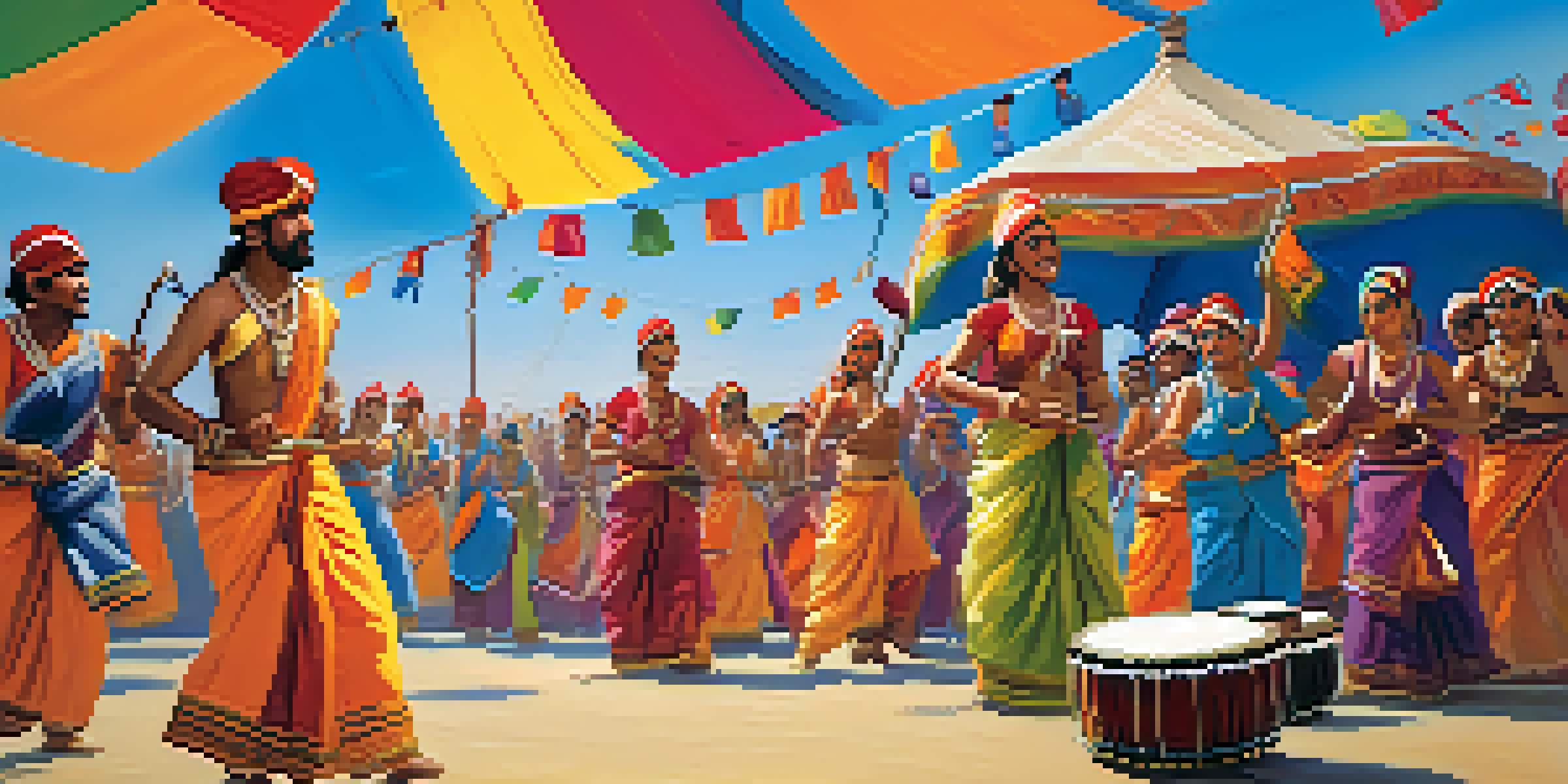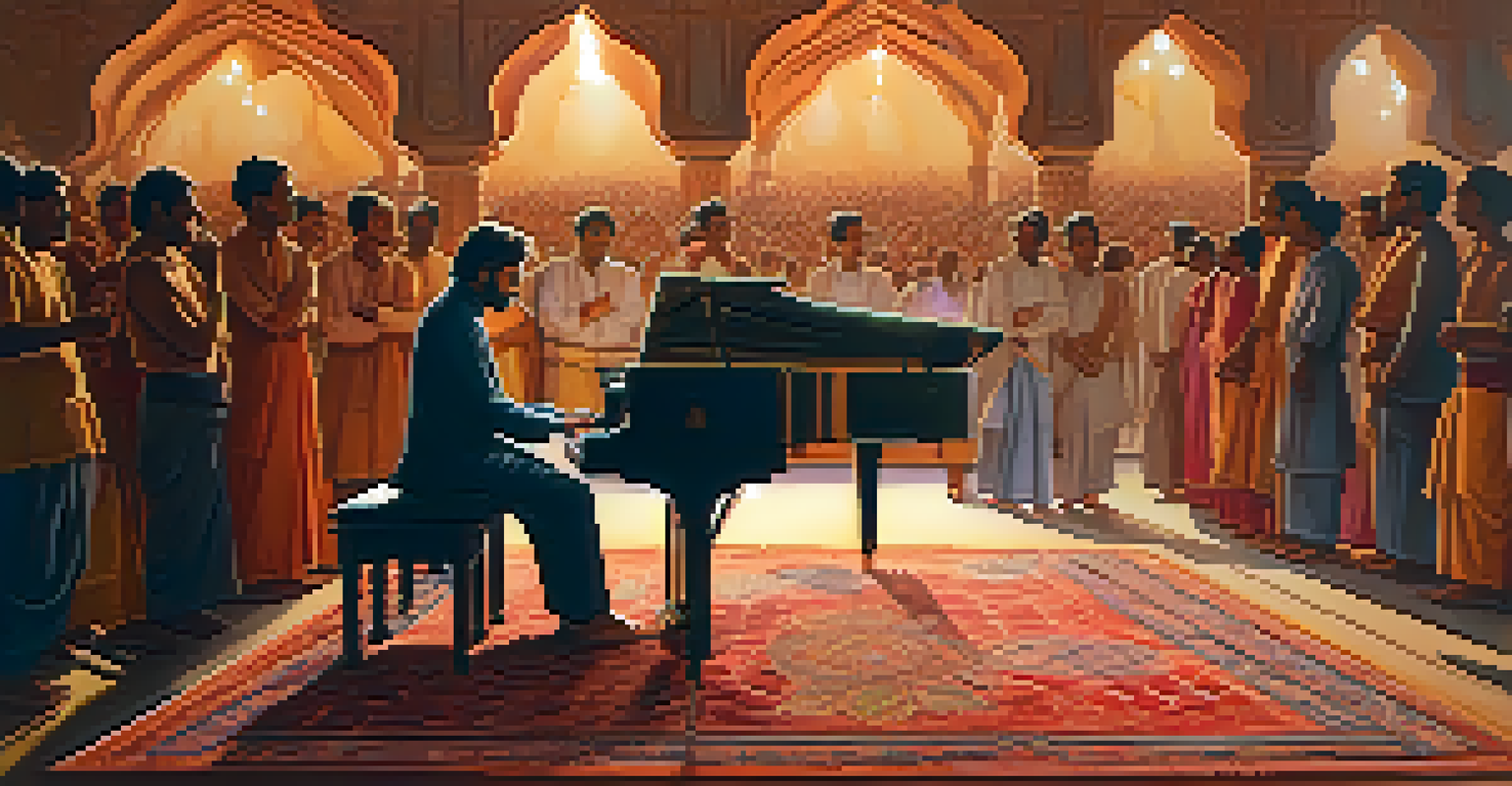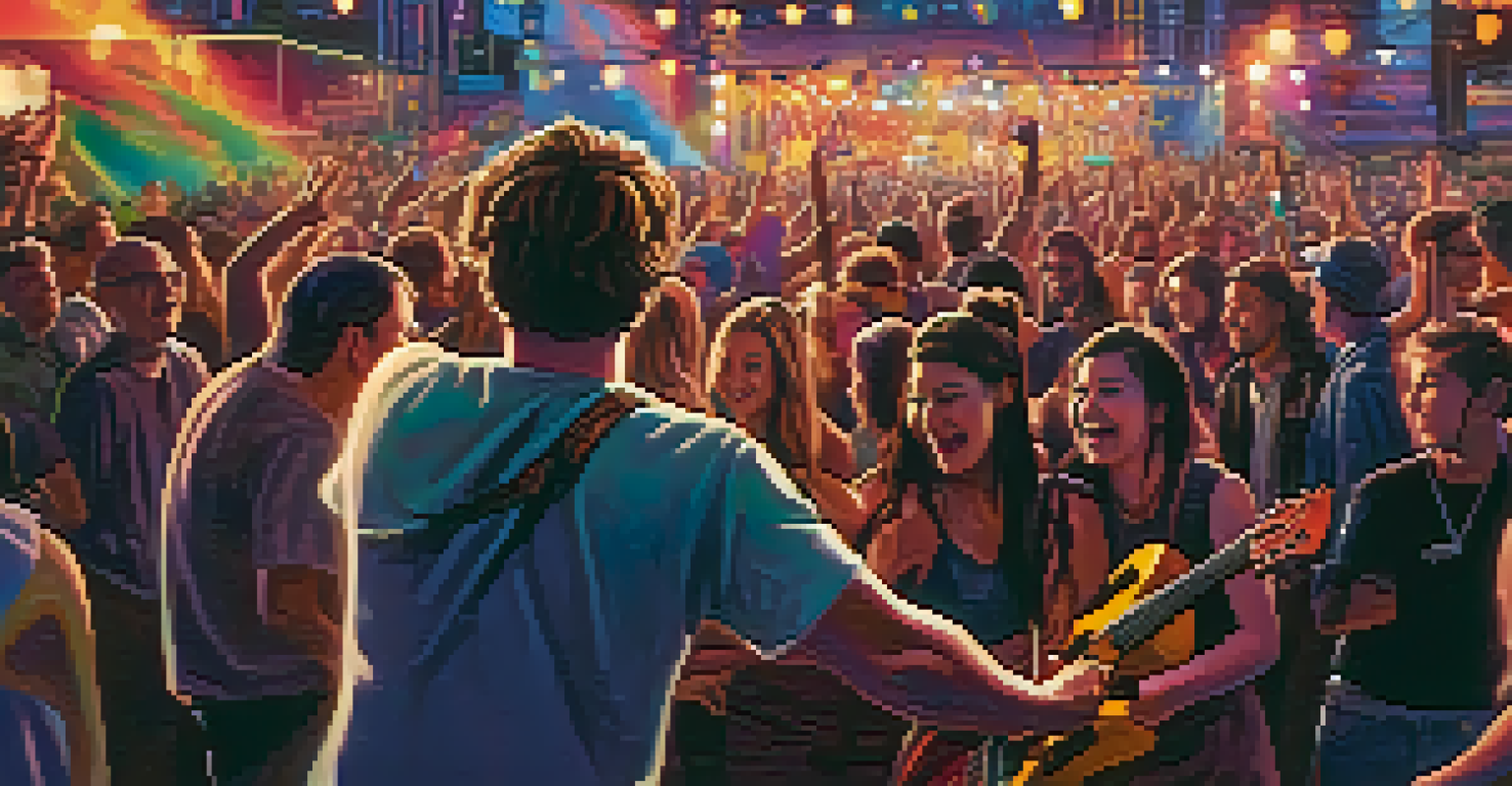Regional Music Festivals: A Celebration of India's Unity in Diversity

Understanding India’s Musical Landscape
India is a land of diverse cultures, languages, and traditions, and this rich tapestry is beautifully reflected in its music. Each region boasts its unique musical styles that tell stories of their heritage. From the classical strains of Carnatic music in the South to the folk tunes of Punjab, the variations are as colorful as the festivals themselves.
Music is the shorthand of emotion.
Music acts as a universal language, transcending barriers and creating connections among people. It’s not just about the notes; it’s about the emotions and stories that resonate across different communities. Festivals celebrate these local sounds, allowing people to experience the essence of a region through its music.
As we explore these festivals, we'll see how they not only showcase traditional music but also foster a sense of belonging and unity among diverse groups. This vibrant musical landscape is a testament to India's ability to celebrate its differences while coming together through the universal love of music.
The Role of Music Festivals in Cultural Preservation
Regional music festivals serve as a vital platform for preserving and promoting traditional music forms that might otherwise fade into obscurity. They provide artists with the opportunity to showcase their skills and share their cultural heritage with a broader audience. In many cases, these events are rooted in centuries-old traditions that are cherished by local communities.

For example, festivals like the Harivallabh Sangeet Sammelan in Jalandhar not only highlight classical music but also encourage younger generations to engage with their roots. This is crucial in a rapidly changing world where modern influences can overshadow traditional practices.
Music Festivals Preserve Culture
Regional music festivals play a crucial role in preserving traditional music forms and fostering a sense of cultural heritage.
By celebrating these festivals, we ensure that the music of our past continues to resonate in the present and future. They become a living archive of cultural history, where each performance contributes to a larger narrative of India's rich musical heritage.
Folk Music Festivals: A Celebration of Local Traditions
Folk music festivals are vibrant events that highlight the local traditions and stories of specific regions in India. Events like the Rajasthan International Folk Festival showcase the rich tapestry of folk music, dance, and art that is integral to the culture of the desert state. Here, attendees can experience the rhythmic beats of the dhol, the soulful melodies of the sarangi, and the vibrant energy of traditional dances.
Without music, life would be a mistake.
These festivals do more than entertain; they educate people about the history and significance behind each performance. The artists often share anecdotes and personal stories that bring the music to life, creating an immersive experience for the audience.
By participating in these festivals, attendees not only enjoy the performances but also gain a deeper appreciation for the cultural narratives that shape the community. This connection fosters a sense of pride among locals and ignites curiosity among visitors, making it a true celebration of unity in diversity.
Classical Music Festivals: A Showcase of Excellence
Classical music festivals in India, such as the Sawai Gandharva Bhimsen Mahotsav, are a celebration of the country's rich heritage in classical music. They attract audiences and artists from around the globe, creating a melting pot of musical styles and influences. These events often feature renowned musicians who share their mastery of classical forms like Hindustani and Carnatic music.
Attending a classical music festival is an experience like no other. The atmosphere is often charged with a sense of reverence as artists perform intricate ragas that evoke feelings of devotion, joy, or melancholy. It’s not just about the music; it’s about the connection between the artist and the audience that creates a memorable experience.
Economic Benefits of Festivals
Music festivals significantly boost local economies by attracting tourists and creating job opportunities for local artisans and vendors.
These festivals play a significant role in nurturing the next generation of artists. Workshops and seminars often accompany performances, providing aspiring musicians with the opportunity to learn from masters in the field, ensuring that India's classical traditions continue to thrive.
Fusion Festivals: Where Tradition Meets Modernity
Fusion music festivals are a testament to India's ever-evolving musical landscape, where traditional sounds blend seamlessly with contemporary influences. Events like the NH7 Weekender attract diverse audiences and feature a mix of genres, from rock to electronica, often incorporating traditional instruments and styles. This fusion creates a unique sound that resonates with both the young and the old.
These festivals not only celebrate music but also promote collaboration among artists from different backgrounds. For instance, a folk musician might join forces with a rock band to create a new sound that respects tradition while pushing creative boundaries. This collaboration fosters innovation and encourages artists to think outside the box.
As a result, fusion festivals become a melting pot of ideas, where music acts as a bridge between the past and the present. They illustrate how India's cultural diversity can come together to create something truly unique, reflecting the spirit of unity in diversity.
Impact of Music Festivals on Local Economies
Regional music festivals have a significant impact on local economies, attracting tourists and boosting local businesses. When a festival takes place, it often leads to increased foot traffic in hotels, restaurants, and shops, creating a ripple effect that benefits the entire community. This economic boost can be crucial for smaller towns and villages that rely on tourism.
Moreover, these festivals create job opportunities for local artisans and vendors. Craft stalls, food stalls, and accommodation providers all thrive during this time, showcasing the region's unique offerings and allowing local culture to shine. This not only supports the local economy but also promotes cultural exchange.
Future of Festivals is Bright
The growing interest in cultural tourism and advancements in technology promise a vibrant future for regional music festivals in India.
In essence, music festivals become a win-win situation: they celebrate the rich cultural heritage while simultaneously providing economic support to the community. This symbiotic relationship between culture and commerce is a powerful reminder of how music can bring people together.
The Future of Regional Music Festivals in India
As we look ahead, the future of regional music festivals in India appears bright and promising. With the growing interest in cultural tourism, these festivals are likely to gain even more attention from both domestic and international audiences. This could lead to increased funding and resources for organizing larger and more diverse events.
Additionally, the advent of technology and social media has transformed how festivals are promoted and experienced. Online streaming options allow people to participate in these celebrations, even from afar, broadening their reach. This digital engagement can attract a younger audience and create new opportunities for artists.

Ultimately, the continued evolution of these festivals will depend on balancing tradition with innovation. By embracing change while honoring cultural roots, regional music festivals can continue to serve as a vibrant celebration of India's unity in diversity for generations to come.